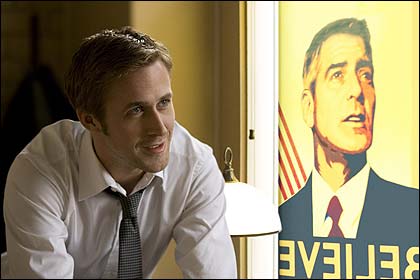
Ides of Meh
Truth and lies, Clooney style
by Molly Templeton
THE IDES OF MARCH: Directed by George Clooney. Written by Clooney, Grant Heslov and Beau Willimon, based on Willimon’s play Farragut North. Cinematography, Phedon Papamichael. Music, Alexandre Desplat. Editor, Stephen Mirrione. Starring Ryan Gosling, George Clooney, Philip Seymour Hoffman, Evan Rachel Wood, Paul Giamatti and Marisa Tomei. Columbia Pictures, 2011. R. 101 minutes. Three Stars.
 |
If you were somehow unaware that politics can turn the most dewy-eyed idealists into cutthroat assholes, never fear: George Clooney is here to disabuse you of that notion. To be fair, it’s not all Clooney’s doing. His new film, The Ides of March, is based on a play by Beau Willimon (who co-wrote the screenplay). The bitterness springs from more than one font.
And such shiny, well-acted bitterness it is. March can’t be faulted for its casting, nor its lovely if sometimes heavy-handed cinematography (like that pretty shot of an ethically compromised man in silhouette in front of a giant flag). The pieces of this campaign are all lined up, from the powerhouse actors to the lauded composer, the respectable star-turned-director to the leading-man-on-the-rise. But March is a runner-up at best.
Part of the problem is that the film spends so much time carefully giving everyone the tools to fuck over everyone else that it forgets it’s about people, not puzzle pieces. Perhaps they’re puzzle pieces in the hands of rival campaign managers Paul Zara (Philip Seymour Hoffman, apparently exerting exactly zero effort) and Tom Duffy (Paul Giamatti). Zara works for the handsome and appealing Governor Mike Morris (Clooney), who evades questions with practiced, eloquent ease. Duffy works for the other guy. This is us versus us; Republicans factor only as the meaner, tougher politicians who will send their people out, in an open primary, to vote for the man they think will be easiest to defeat.
Zara and Duffy are flip sides of the same coin; Stephen Myers (Ryan Gosling) is the new blood. Young, attractive, intense, Stephen is the hot up-and-comer, the next big man on the campaign, which makes it particularly amusing when he seems incapable of considering the potential ramifications of his actions. He’s media smart, maybe, but not people smart. Gosling’s intense, uncertain charisma almost turns Stephen into a believable character, but the film’s opening and closing scenes show him for what he is: a mouthpiece for pat phrases that he isn’t required to believe.
Clooney, in a smallish role, gives good speech and chastely kisses his wife (whose name you’ll only know if you catch it on campaign signs) in one of the cozy moments the film sets in contrast with the political bustle. A tousled Marisa Tomei turns in a nice bit of supporting work as a reporter who knows exactly how to juggle and present information to get what she wants.
Evan Rachel Wood’s Molly Stearns, cute and brash, gets coffee and gets laid. (She seems to be the only person around who can think of anything but the campaign — with considerable consequences.) After a snappy flirtation scene with Stephen, who can’t keep his mind off Morris even in the sack, Molly becomes primarily and frustratingly a plot device. She’s proof that good guys can do bad things too — an apparently shocking revelation that knocks Stephen off his idealistic cloud.
The Ides of March could be called politically relevant, insofar as it’s a timely and well-made drama about the bitter realities of believing in “hope” and then trying to work within the cracked and tattered system you’ve been handed. But don’t mistake relevance for insight. Watching Gosling’s bright-eyed character become his dead-eyed Drive persona all over again holds a certain fascination, but the rest of the film has an effect rather like that of watching hours of CNN: You’re sad, disgruntled and wondering why we still subscribe to a system that’s built to destroy any chance for true change.